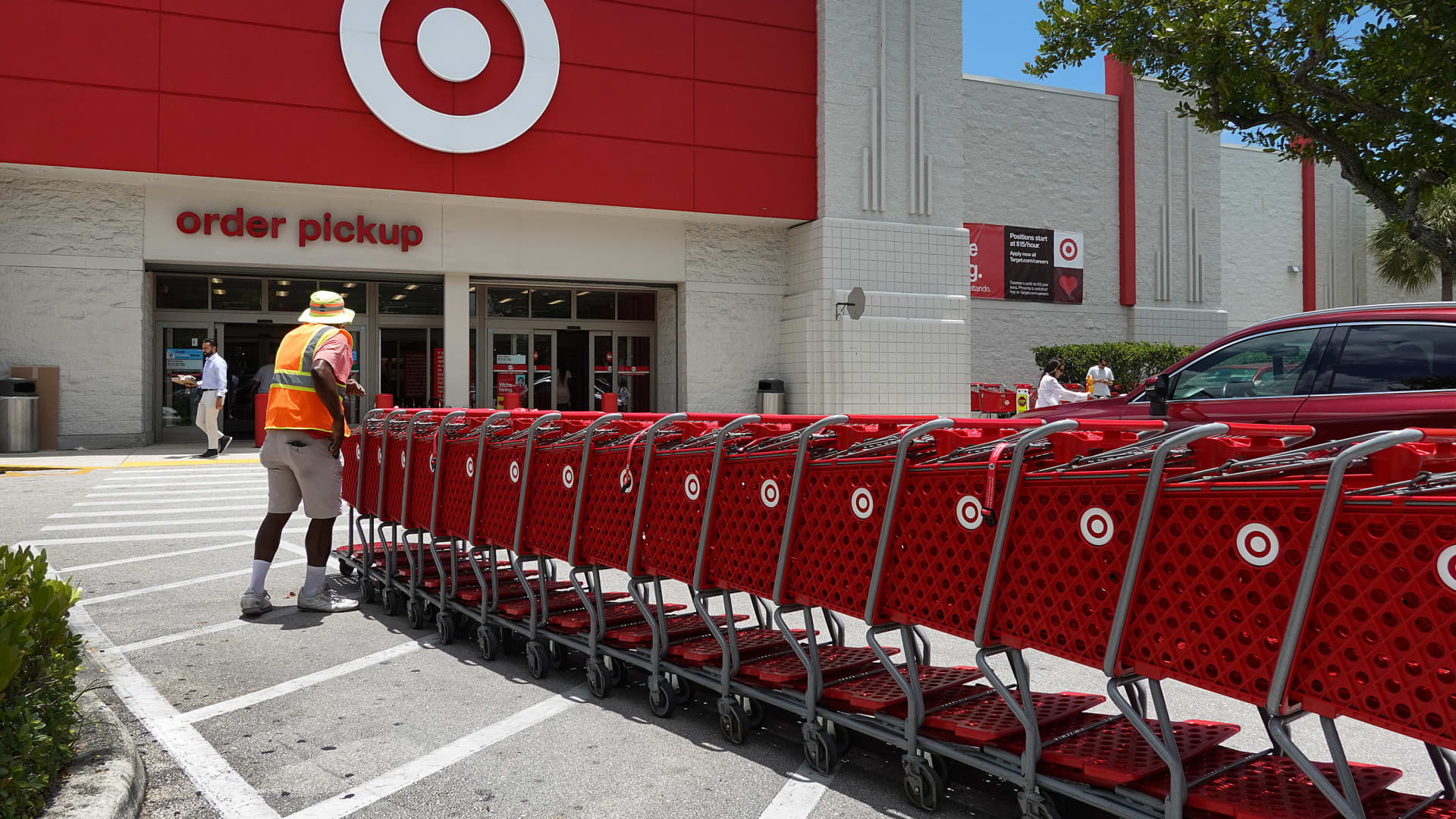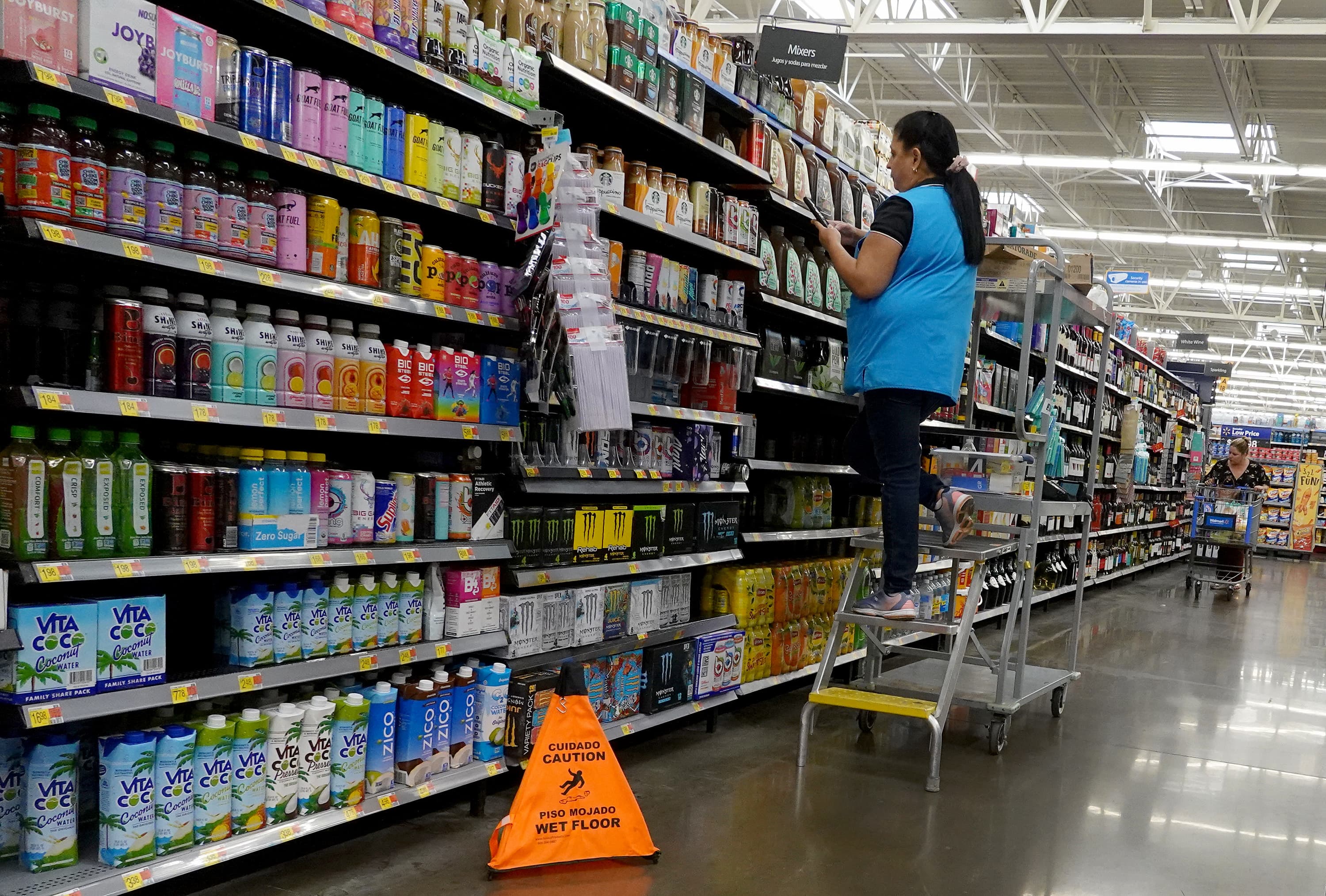More grocery purchases. Fewer ambitious do-it-yourself projects. And last-minute splurges at the store.
This week, some of the biggest retailers in the country reported earnings and described how their customers are shopping. As Home Depot, Target and Walmart reported their quarterly sales and shared full-year outlooks, the companies offered up the latest clues about the health of the American consumer — and previewed what could be ahead for the economy.
related investing news
Some smaller retailers also offered warnings signs for the current quarter and this year.
Next week will give even more insight into the retail industry and economy. Best Buy, Lowe’s, Costco, Dollar Tree and Kohl’s are among the earnings on tap. Some mall retailers are also reporting, including Gap, American Eagle and Abercrombie & Fitch.
Here are some of the emerging themes:
Sales trends have weakened.
So far, at least five retailers – Target, Walmart, Tapestry, Bath and Body Works and Foot Locker – have spoken about sales trends across the country getting worse.
As the three-month period went on, shoppers spent less — especially on discretionary merchandise, Target CEO Brian Cornell said on a call with investors. Walmart noticed the same pattern.
Both of the big-box retailers reported a sharp sales drop after February.
Walmart Chief Financial Office John David Rainey attributed that decline, in part, to the end of pandemic-related SNAP benefits and a decrease in tax refunds.
Cornell said headline-grabbing events could have shaken consumer confidence, too. He pointed to the March banking crisis. Silicon Valley Bank collapsed that month, sparking fears of broader economic woes.
Bath & Body Works saw sales fall off in March. Yet they recovered in April as the retailer turned to a common playbook: Promotions. It got a boost as customers spent money at sales events toward the end of the quarter, Chief Financial Officer Wendy Arlin said on a Thursday earnings call.
Foot Locker also said it may have to motivate shoppers with markdowns for the rest of the year. The company cut its full-year forecast on Friday, as it reported earnings that missed expectations. CEO Mary Dillon said in a statement that “sales have since softened meaningfully given the tough macroeconomic backdrop.”
On a call with investors Friday, Dillon said the sneaker seller’s sales got hurt by lower tax refunds and high inflation as customers spent more on food and services. While she said sales rebounded in April, “they did not improve nearly to the extent we expected and that weakness has continued into May.”
A few other retailers that reported earnings had specific factors working in their favor.
When Tapestry, the parent company of Coach and Kate Spade, reported earnings last week, the company said sales softened as the quarter progressed and into April as consumers became more cautious.
But it has a factor going for it that some other retailers don’t: A growing business in China and other international markets to offset some of those softer sales.
Home Depot bucked the slowing sales trend — but that may have to do more with what it offers than consumer health.
Spring is peak season for home improvement. The retailer’s comparable sales in the U.S. declined 4.6% in the quarter versus the year-ago period. In February, its comparable sales were down 2.8%. March was its weakest month of the quarter, as comparable sales fell nearly 8% year over year in the U.S.
Home Depot’s trends were still negative in April, but saw a slight improvement as comparable sales slid 3.7%, according to Chief Financial Officer Richard McPhail. Customers may have been buying more spring items, like potted plants.
Inflation is still a big factor.
Inflation is easing, according to a Labor Department report this month. Yet that’s cold comfort for shoppers who are still paying a lot more at the grocery store than they were a few years ago.
Stubbornly high prices, especially for food, are a storm cloud that hangs over many families who shop at Walmart — and looms over the retail industry as a whole, the big-box giant’s CEO Doug McMillon said. On a call with investors on Thursday, he called the persistent inflation “one of the key factors creating uncertainty for us in the back half of the year.”
“We all need those prices to come down,” he said on the call. “The persistently high rates of inflation in these categories, lasting for such a long period of time, are weighing on some of the families we serve.”
For example, he said general merchandise costs in the U.S. are lower than a year ago, but still higher than two years ago. In dry grocery and consumables categories, Walmart is seeing high single-digit to low double-digit cost inflation on items like toilet paper or paper towels. For food, inflation has climbed more than 20% on a two-year basis, according to Walmart’s Rainey.
Walmart is feeling the inflation crunch even though it is better positioned to manage higher costs than other retailers are. As the nation’s largest retailer and biggest grocer, Walmart can use its scale to manufacture private label merchandise or negotiate with vendors over price.
One rare item that dropped dramatically in price? Lumber. Home Depot cited the sharp price decrease as a factor that contributed to its fiscal first-quarter revenue miss.
In plenty of other categories, though, inflation is still driving a higher average ticket for customers, Home Depot CEO Ted Decker said on an earnings call Tuesday.
Consumers are spending on needs, not wants.
Target, Home Depot and Walmart all saw a noticeable pattern: Fewer pricey and fun items in shopping carts.
At Home Depot, customers bought fewer big-ticket items like appliances and grills in the fiscal first-quarter.
Home projects got more modest, too, Decker said on an investor call. Contractors and other home professionals noticed a change from large-scale remodels to smaller renovations and repairs.
Decker said consumers’ increased focus on value could be contributing to that shift, along with an uptick in spending on traveling, dining out and other services. He added that some homeowners already tackled big projects and bought some high-priced home items during the early years of the pandemic, leaving less for them to do or to buy now.
The trend extended beyond home improvement.
Customers at Walmart have become more selective when shopping for electronics, TVs, home items and apparel, Rainey told CNBC. The items have become a tougher sell and when customers do buy them, they often wait for a sale, he said.
At Target, sales declined in some discretionary categories by as much as low double-digits as customers bought less clothing and home decor, Chief Growth Officer Christina Hennington said on an investor call. Groceries and essentials drove a bigger portion of the retailer’s quarterly sales.
One exception? Beauty. Hennington said Target’s beauty category was its strongest in the fiscal first quarter. Sales grew in the mid-teens year over year — showing shoppers are still willing to replenish the cosmetic case and get a new tube of lipstick.
Weather dampened demand (literally).
Weather has not worked in retailers’ favor, at least not yet.
As the weather turns warm and sunnier, it can inspire shoppers to buy summer dresses, beach towels or gardening supplies.
Yet Home Depot said cooler and wetter weather in California and parts of the western U.S. hit its sales, contributing to its biggest revenue miss in more than 20 years.
Walmart is eager for warmer weather, too. Sam’s Club has noticed slower sales of patio sets, perhaps because of the later-to-hit spring weather, its CEO Kath McLay said on an investor call. Walmart has seen a sharp drop in air conditioner sales at its big-box stores, its CFO Rainey said.
“We’re ready to get some spring or summer weather,” he said on a call with CNBC.
Target noted it’s looking forward to another upcoming season: Back-to-school.
The discounter expects to get a sales boost in the back half of the year, thanks to the big shopping season, Hennington said on an investor call. She said that the return to classrooms and college dorms triggers sales across almost every department of its store, from lunch ingredients in the grocery aisles to new outfits in the kids’ clothing department.
Shoppers have become more last-minute.
Retailers may be saying so long to the days of stockpiling and early shopping.
Company leaders said there are signs that shoppers are reverting to some of their old ways.
At Walmart-owned Sam’s Club, McLay said shoppers are not just opting for lower price points. They’re also shopping later for seasonal items. For example, she said, customers used to buy patio furniture just as soon as it was set at the stores.
“Now we’re seeing people wait a little bit later into the season,” she said.
It saw a similar pattern with Mother’s Day sales, she said.
McLay said that may indicate people have returned to shopping habits of 2018 and 2019. The trend could be fueled by shoppers’ reluctance to open up their wallets or because they’re not as worried about out-of-stock items — or a combination.
At Target, shoppers have also embraced more procrastinator tendencies, especially for discretionary items like apparel.
“Guests are shifting to shop more just-in-time in these categories, as they wait until the last moments before key events to invest in new decor or wardrobe refreshes,” Hennington said on an earnings call.




